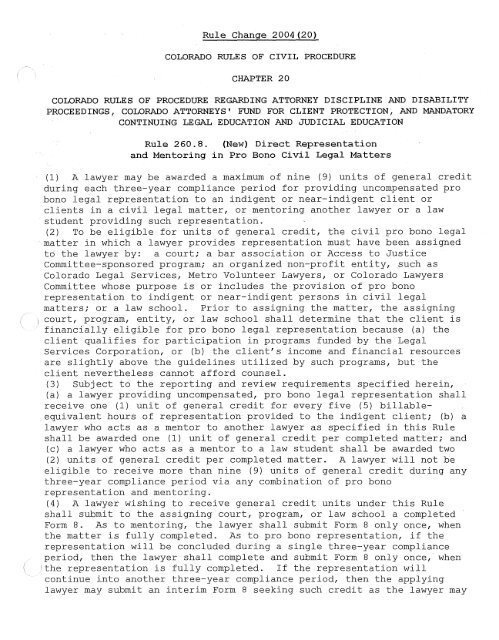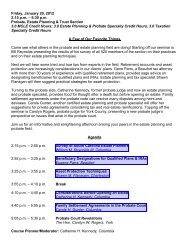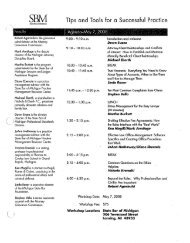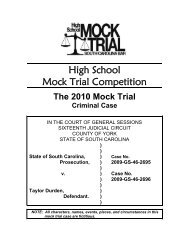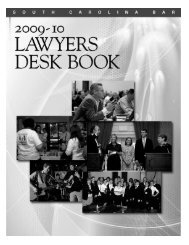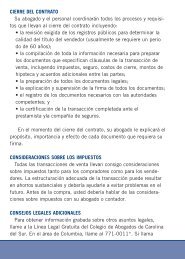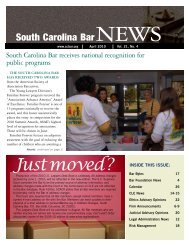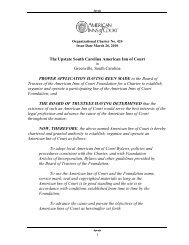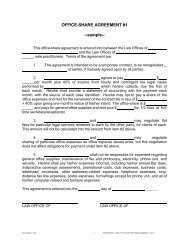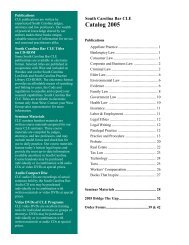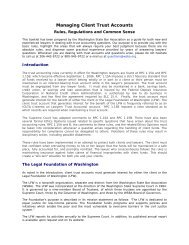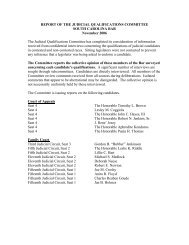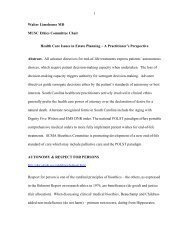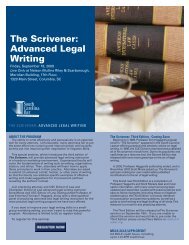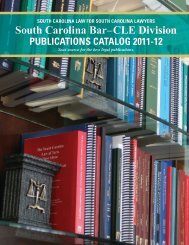Practicing With Professionalism - South Carolina Bar Association
Practicing With Professionalism - South Carolina Bar Association
Practicing With Professionalism - South Carolina Bar Association
You also want an ePaper? Increase the reach of your titles
YUMPU automatically turns print PDFs into web optimized ePapers that Google loves.
Rule Change 2004(20)<br />
COLORADO RULES OF CIVIL PROCEDURE<br />
CHAPTER 20<br />
COLORADO RULES OF PROCEDURE REGARDING ATTORNEY DISCIPLINE AND DISABILITY<br />
PROCEEDINGS, COLORADO ATTORNEYS' FUND FOR CLIENT PROTECTION, AND MANDATORY<br />
CONTINUING LEGAL EDUCATION AND JUDICIAL EDUCATION<br />
Rule 260.8. (New) Direct Representation<br />
and Mentoring in Pro Bono Civil Legal Matters<br />
(1) A lawyer may be awarded a maximum of nine (.9) units of general credit<br />
during each three-year compliance period for providing uncompensated pro<br />
bono legal representation to an indigent or near-indigent client or<br />
clients in a civil legal matter, or mentoring another lawyer or a law<br />
student providing such representation.<br />
(2) To be eligible for units of general credit, the civil pro bono legal<br />
matter in which a lawyer provides representation must have been assigned<br />
t6 the lawyer by: a court; a bar association or Access to Justice<br />
Committee-sponsored program; an organized non-profit entity, such as<br />
Colorado Legal Services, Metro Volunteer Lawyers, or Colorado Lawyers<br />
Committee whose purpose is or includes the provision of pro bono<br />
representation to indigent or near-indigent persons in civil legal<br />
matters; or a law school. Prior to assigning the matter, the assigning<br />
court, program, entity, or law school shall determine that the client is<br />
financially eligible for pro bono legal representation because (a) the<br />
client qualifies for participation in programs funded by the Legal<br />
Services Corporation, or (b) the client's income and financial resources<br />
are slightly above the guidelines utilized by such programs, but the<br />
client nevertheless cannot afford counsel.<br />
(3) Subject to the reporting and review requirements specified herein,<br />
(a) a lawyer providing uncompensated, pro bono legal representation shall<br />
receive one (1) unit of general credit for every five (5) billableequivalent<br />
hours of representation provided to the indigent client; (b) a<br />
lawyer who acts as a mentor to another lawyer as specified in this Rule<br />
shall be awarded one (1) unit of general credit per completed matter; and<br />
(c) a lawyer who acts as a mentor to a law student shall be awarded two<br />
(2) units of general credit per completed matter. A lawyer will not be<br />
eligible to receive more than nine (9) units of general credit during any<br />
three-year compliance period via any combination of pro bono<br />
representation and mentoring.<br />
(4) A lawyer wishing to receive general credit units under this Rule<br />
shall submit to the assigning court, program, or law school a completed<br />
Form 8. As to mentoring, the lawyer shall submit Form 8 only once, when<br />
the matter is fully completed. As to pro bono representation, if the<br />
representation will be concluded during a single three-year compliance<br />
period, then the lawyer shall complete and submit Form 8 only once, when<br />
the representation is fully completed. If the representation will<br />
continue into another three-year compliance period, then the applying<br />
lawyer may submit an interim Form 8 seeking such credit as the lawyer may


